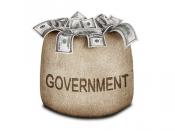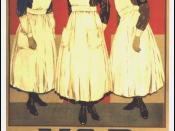Women had been protesting for the right to vote for many years. They believed that they deserved the right to have the vote because 60% of men already had the vote. Women believed that men's views of the 'inferior' women were outdated and they believed that they deserved more in a twentieth century society. Women had previously been denied the vote because of the threat of the forthcoming war. Also troubles in Ireland had also preoccupied the Government and forced them to put the women's issue on the backburner. The People's Budget of 1909 caused many other problems. The money needed by the Government to help the quality of living for thousands of British families forced them to install many new taxes. These taxes directly affected the House of Lords because these were the people who would be paying for the People's Budget. The Lords vetoed Budget and then the MP's brought in the Parliament Act, which meant that the MP's could bypass the Lords and pass any law.
All of these factors coincided with the build up to the Great War.
In the years leading up to the War, women's equality was nearing a conclusion. Events on the home front had so far preoccupied the Government and stopped them even considering women's rights. Many people believed that women would have got the vote even without the War. This could be true, but it changed people's perceptions completely about women's roles and their strengths. The War greatly assisted people's views of women, but by the end they had not stayed in the jobs that they had filled during the War years. Herbert Asquith, in 1916, began to face up to the fact that women were going to get the vote. With so many women aiding the war effort, he realised...


